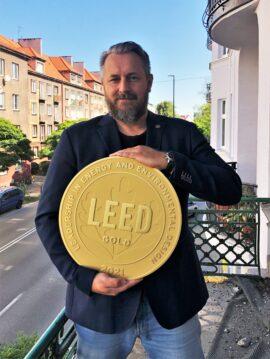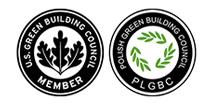
In May 2021, the extension project for the chewing gum production factory for Mars in Poznan, Poland was completed. The LEED consultant for this project was visio architects and consultants who successfully carried out the project and achieved a LEED Gold certification directly for the client. The project gained a total of 69 points out of the possible 110. The certification itself was granted on June 10, 2021, under the LEED 2009 New Construction rating scheme.
Covering an area of 6850 square meters (73 750 sqft), the new extension, among other facilities, consisted mainly of a packing hall. This was the subject of the required LEED certification. The project itself was designed by Bilfinger Tebodin Poland and constructed by MCKB
Mars’ Commitment to Sustainability
The company has declared a long-time commitment to sustainability and shows this commitment, apart from other initiatives, by investing in LEED-certified buildings. Other than this, the company also focuses on using eco-friendly packaging, sourcing raw materials more consciously, and way more. The need to design and develop sustainable facilities such as this one is just a natural and consequent step of what the company stands for in terms of sustainability.
Brief Introduction of the Design
The new extension mainly included a packing building. This building was designed to be a combination of a single-storey hall along with a mezzanine floor and a two-storey passageway with technical rooms on the first floor. The structure of the production part of this extension was a steel skeletal structure while the technical part was made out of reinforced concrete.
Sustainability Goals:
Mars defined some of the goals that had to be met in regards to the sustainable aspects of the building. Some of these included:
- Achieving a LEED Gold certification.
- Ensuring high energy performance.
- Reusing energy created by the production wastes.
- Achieving a high indoor quality standard.
- Using eco-friendly and non-toxic finishing materials.
- Creating a sustainable image of the building to attract employees.
- Reducing water consumption.
There were many other points laid out by the company to ensure that their new production facility would be a symbol of sustainability.
The Results

visio was able to secure the required LEED Gold certification for Mars by consulting with the design, GC, subcontractors, and other team members. In the category of Sustainable Sites, the project received 20 out of 26 points. Special consideration was given to ensuring the site’s connectivity with the community and providing alternative transport methods like public transport, bicycles, and low-emitting vehicles.
In the category of Water Efficiency, visio was able to help the building get all 10 possible points by reducing water use and reusing waste water in different ways. It is worth mentioning that the project did reach the Innovative threshold with as much as 54.5% water use reduction.
In the category of Energy & Atmosphere, visio helped the project secure 14 out of 35 points by focusing on minimizing energy use and optimizing energy performance as much as possible, keeping in mind the building’s use and typology. The cost of energy use of the building was generally reduced by 28.9% in comparison to the building baseline.
Special consideration was given to using building materials that had a certain amount of recycled content in them and also to the management of construction waste. These steps helped the project secure 5 points in the Material & Resources category.
An impressive 11 out of 15 points were awarded to the project in the Indoor Environmental Quality category, which is usually a challenge in typical production facilities. Some of the solutions included in the design revolved around increased ventilation, using low-emitting materials, controlling indoor pollutants, and ensuring thermal comfort, etc.
As far as Innovation Design goes, the project received 5 out of 6 points and it also achieved all 4 points in Regional Priority Credits.
All in all, the project was a strong success in terms of what it was set out to achieve. By employing various sustainable solutions, visio (in a very secure manner) helped MARS Poland to get 69 as opposed to the required 60 points in order to receive the LEED Gold certification that was set by the client as a project goal.
This post is written by Saram Maqbool – Architect and Life-Cycle Assessment Analyst at visio.


